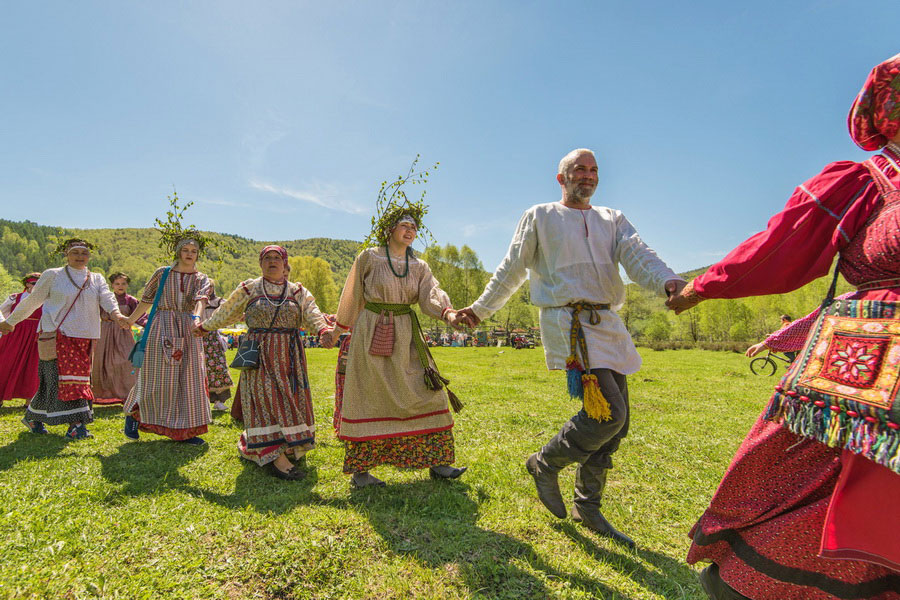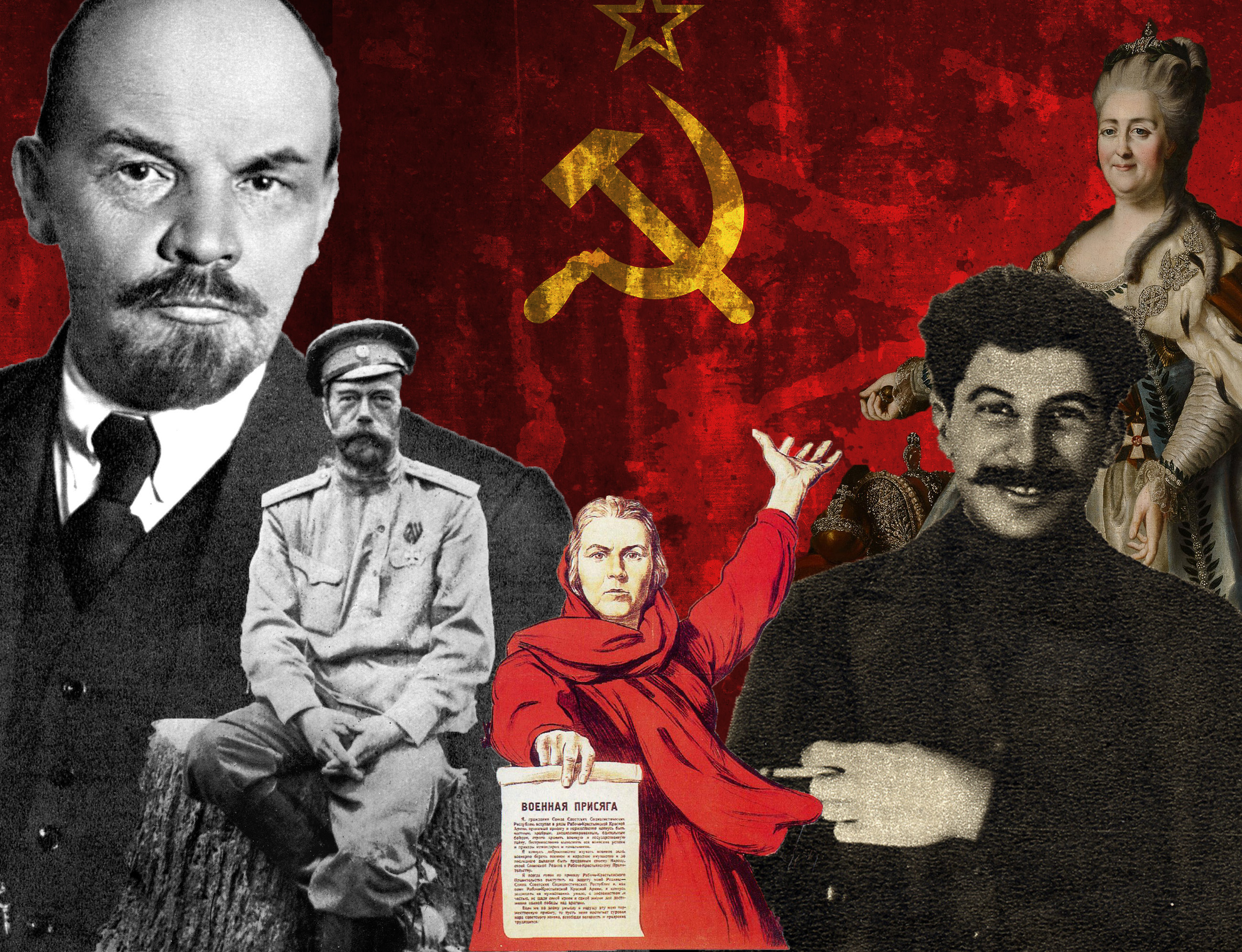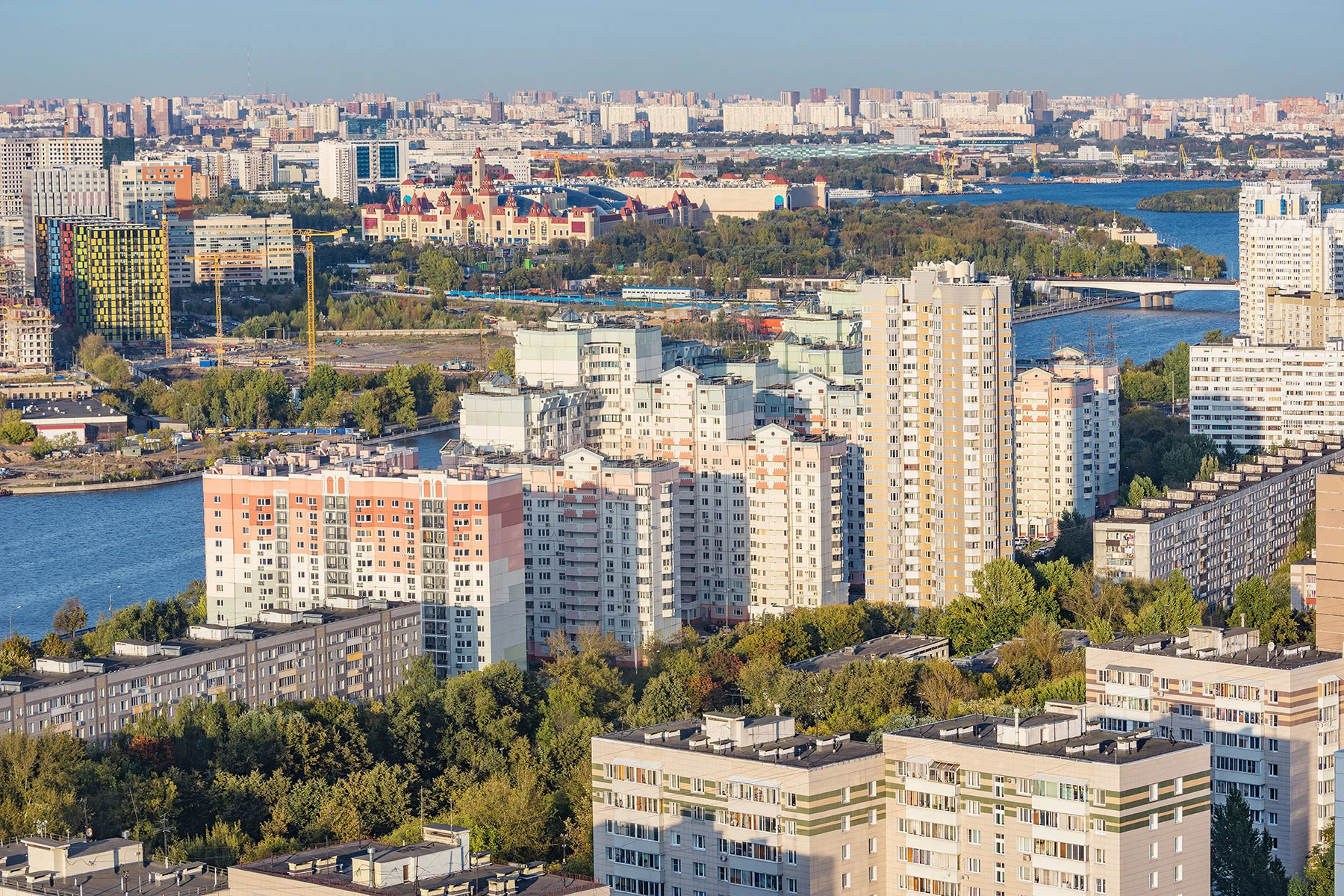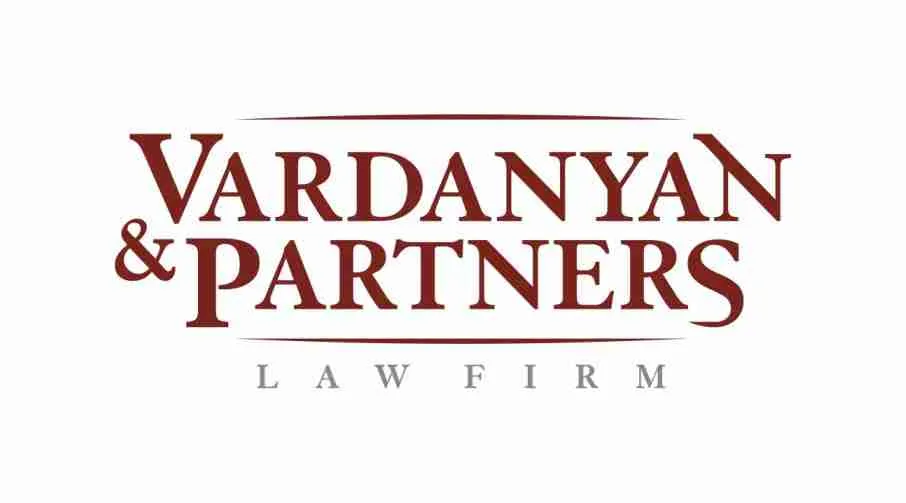Blog layout
Russian Customs

1. Spitting and touching wood
Many superstitious Russians believe in the evil eye (an evil look bringing bad luck) – particularly bringing the evil eye on any compliments or good events. So don’t be alarmed if, after complimenting a child, their parent spits three times over their left shoulder, or touch a wooden surface three times (or their head, if there isn’t any wood in sight) – provided the parent is in earshot, of course! This custom is also done if someone tells you about some success of theirs (for instance, getting a new job), or if they’re going on holiday.
2. Don’t hand people money
It’s widely believed in Russia that money transmits energy from its owner (including negative energy); which can be transmitted if the money is placed directly from the hands of its previous owner to the new owner. Instead, if in a shop, you will be required to place your money into a tray, and likewise, your change will be placed there too for you to pick up, as the link of energy will be broken. I didn’t really think about how I was handing over my money at the time, but after reading into this, I realised that that was how I always paid – from everything to a hot chocolate in Starbucks, to a pair of shoes!
3. Never give clocks, scarves or knives as presents
Clocks are seen as an omen of parting, scarves of tears and knives of enemies; and so none of these are seen as a good present to give someone. If, however you don’t realise this fact and you do present one as a gift, expect to receive a coin from the recipient – take the coin, as it’s as if the recipient bought the gift, thus ending the bad omen.
4. Always give an odd number of flowers
Flowers are an extremely popular gift in Russia, and as a teacher, expect to be showered with bouquets of flowers from your students on the last day of school. However, if you plan on giving someone else a bouquet of flowers, make sure you know the rules. Firstly, you MUST make sure that you hand over an odd number of flowers, as an even number signifies funerals. Some people also see yellow flowers representing funerals, so if you’re unsure, opt for another colour.
5. Remove your shoes
Something that a lot of cultures consider polite, you should ALWAYS take off your shoes when entering a Russian house – the streets are dirty in large cities; and you’ll probably find that your host will provide you with slippers anyway.
6. Keep your glass half full
As would be expected, Russians are impressive vodka drinkers, and can often assume that you’re as hard-core as them. An empty glass in Russia will always be refilled, so if you feel like you’ve reached your limit, make sure your glass has some drink in it. If you don’t feel like drinking, just say that your doctor told you not to drink – no one will question it.
7. Don’t place empty bottles on the table
Continuing nicely from heavy vodka-drinking, when a bottle is empty, be sure to place it on the floor. An empty bottle left on the table is seen as bad luck.
8. Respect Babushka
The ‘babushka’ (or grandma) has a lot of respect and power in Russia – there is no point in arguing with them, because they will win regardless. Also (as is polite in the UK), give them your seat on the metro, tram or bus because if you don’t, they may start yelling at you, especially if you’re a guy. Again, saying that, when I gave up my seat to an old lady on the metro, she moved along so I could sit back down – Russians may have a reputation for being cold, but the majority are actually quite nice!
9. Don’t step on the grass
A common downfall of tourists, make sure you don’t step on any grassy areas in public places – especially in major tourist attractions such as the Summer Gardens in St Petersburg – as the police are known to closely monitor this, and fine you on the spot. You will however, find signs reminding you of this fact, but it’s just worth remembering! Another tourist trap to avoid is to refrain from taking pictures inside the metro and shopping centres as it’s illegal – you may get away with it, but then again, you may find a policeman behind you, ready to hand you a fine.
10. Avoid overly-smiling in the streets
The stereotypical cold, unfriendly Russian is partly down to their stern expressions; and one way foreigners are instantly spotted is by smiling. In Russia, there is a saying that “to smile with no reason, is a sign of a fool” – and a person smiling in the street can often be thought of as drunk or mentally ill. So before heading off on your Slavic adventure, be sure to practise your best ‘serious Russian face’ (that’s what I did!) – it comes especially in handy when riding the metro – a pout and furrow of the brows, and people won’t look at you twice!
History of Russia

The history of Russia begins with the emergence of the Slavs who appeared around 3-3,500 years ago, evolving from the Indo-European ethnic group. From the middle of the first millennium B.C. they began to move in to Eastern Europe and populated the basin of Dnieper, Dniester, Western Dvina, Oka and upper Volga by the 8th century B.C.
The first Russian state Kievan Rus’ existed for about 300 years. It was a federation of principalities, ruled by the Rurik clan. The development of feudal relations and the strengthening of the independence of separate cities resulted in political fragmentation of Kievan Rus’. In the late 1330s the Mongols descended upon Rus’ and it was put under the suzerainty of the Khanate of the Golden Horde for almost 250 years. The yoke accelerated Rus’ dissolution, but at the same time progressively turned into an incentive for integration as the economy and culture were reviving. Due to a number of factors, in the beginning of the 14th century, Moscow took the place of the political leader, which is explained by its favorable geographical position and far-sighted policy of its princes (knyazes).
17-18th centuries marked a new period in Russian history, when the capitalist system began to form, while the feudal system remained and even strengthened. The historical period known as “Time of Troubles” caused by extinction of Ruriks with the death of Ivan IV the Terrible’s son played an important role in these events. The social unrest caused by famine and strengthening of feudal exploitation sparked to such an extent that resulted in the first peasant war in the country’s history.
The era of Peter the Great became the time of serious changes, embracing all aspects of state and public life. The efforts of Peter I produced excellent results, although they were achieved by violence and exploitation of people. Their main result was the country's transformation into maritime power that significantly accelerated its development, reserving a rightful place for it among European states.
The reign of Catherine II is called "the golden age of nobility" and "enlightened absolutism" as the Empress completed the process of nobility’s transformation into the privileged class. The situation considerably worsened for the peasants: serfdom acquired the features of slavery. The increase in social conflicts resulted in the E.Pugachev’s peasant war, but its failure led to the expansion of feudal dependence. All this heralded the maturing crisis of the feudal system, acutely manifested in the 19th century.
By the beginning of 1812 most of Europe fell in vassalage from France. Russia and Britain were the only countries that posed a threat to Napoleon's plans. In 1812 Napoleon invaded in Russia with powers three times exceeding the western Russian army under the command of generals, but after six months of his campaign, the army, the strongest in history, was completely destroyed.
By the middle of the 19th century servile relationship in the country worsened and deteriorated: they aroused the landlords’ fears for the future, while the serfs had the growing discontent of their miserable condition. In the context of peasant unrest, particularly during the Crimean War, in 1862 the government, headed by Alexander II held a reform to abolish the serfdom.
In the years before the First World War 1914-1917, Russia's foreign policy was determined by the priority for rapprochement with Great Britain, enforced by the agreement of 1907 on the division of spheres of influence in Iran and Central Asia. This agreement led to the finalization of the Triple Entente- "good will agreement" of the military-political union of England, France and Russia, and Russia's participation in World War II. The internal political crisis that resulted in the February revolution in 1917 led to Russia’s recovery from the war. The revolution destroyed the old state system and established a new political situation. Power in Russia was seized by the Bolshevik Party headed by Vladimir Lenin, and the Soviets of Workers', Soldiers' and Peasants' Deputies was proclaimed the supreme state power authority. The Union of Soviet Socialist Republics (USSR) was established on 30 December 1922. After Lenin's death, internal political struggle deteriorated, and Joseph Stalin, who established a dictatorship and destroyed all his political rivals, came to power. In 1939 Russia and Germany signed a nonaggression pact, but on 22 June 1941 Nazi Germany attacked the Soviet Union, thus violating the treaty. So the World War II began. During the battles of Stalingrad and Kursk, Soviet troops assumed the offensive and defeated the German army, victoriously ending the war in May 1945 by taking Berlin.
Stalin died in 1953, after that the country saw a certain policy liberalisation and the rehabilitation of a number of victims of Stalinist terror. The Khrushchev's Thaw came. The First Secretary of the CPSU- Nikita Khrushchev denounced Stalin's personality cult, held a series of democratic reforms and massive rehabilitation of political prisoners. The Khrushchev's removal from power heralded the beginning of so-called stagnation era - a period marked by the absence of any major upheavals in the political life of the country, as well as social stability and relatively high living standards.
In 1985 Gorbachev announced perestroika (set of political and economic reforms),by the beginning of the 1990s, the restructuring resulted in the USSR disintegration. A referendum held on 12 December 1993 adopted the Constitution of the Russian Federation, declaring Russia a democratic federal state with a republican form of government with the president at the helm
Buy or Rent Property in Russia
Renting property
Renting is very common among the expats that live in Russia. Many of the available rentals are apartments in high rise blocks, and flatshares (particularly in larger cities) are also quite common. You can expect to pay a security deposit that is equivalent to one month’s rent, and sometimes your first month’s rent must be paid in advance.
Tenancy agreements must be drawn up in both Russian and the tenant’s native language. Terms are usually restricted to between one and three years. Utilities are typically included in monthly rental prices, but you should always double check this.
In Russia, rental payments in cash are not uncommon. Generally speaking (with permission from the landlord, of course), tenants can assign, sub-let or transfer rights to the property. You are often also allowed to make various alterations to it.
Rent contracts for a period of one year or more should always be registered in the State Registration Office.
Where can expats find details of properties to rent ?
The rental market in Russia (particularly in Moscow) is mostly dominated by agencies. Even when conducting your search online, you will likely find that the majority of the postings are done via agencies. You should be aware that there are many fraudulent websites. Some of the genuine, popular sites include:
• Evans.ru
• Expat.ru
• Propertyshowrooms.com
If you decide to go down the route of using an estate agent, or end up finding a listing that you like that has been posted by an agency, bear in mind that their commission will usually be equivalent to one months’ rent.
The rental market in Russia is mostly dominated by agencies
If you can read and speak Russian, then you will have more luck finding a private landlord by looking out for adverts in local shops and newspapers, as well as by asking around within your friendship circle.
What are typical rental prices in major expat destinations?
According to online statistics website Numbeo, the average one-bedroom city centre apartment costs around 24,037.41 руб (Russian Rouble). This is equivalent to £260.52 or $324.02. An apartment of the same size but further out of the city costs closer to 16,448.31 руб (£178.27 or $221.72). A three-bedroom apartment in a central city location costs, on average, 43,152.47 руб (£467.69 or $581.50) in monthly rent, whereas its more suburban counterpart can cost a little over half of that amount.
Are there any challenges/problems in the rental process that expats often encounter ?
Firstly, be on alert for any potential property scams. Secondly, the way in which properties are advertised may initially confuse you if you are unfamiliar with it. In Russia, you will see that an apartment may be referred to as a “three-room apartment”, but this is the total number of rooms (excluding kitchens and bathrooms). So a three-room apartment is most likely to be an apartment with one or two bedrooms, a living room and/or an office or study, rather than three bedrooms.
Buying property
Unrestricted foreign ownership of property has been permitted throughout Russia for the past decade. However, purchasing property remains relatively unpopular among expats.
What is the typical house buying procedure ?
If you don’t speak Russian, it is highly advisable to work with a reputable property agent, as well as a local lawyer, throughout the buying process.
Before you do anything else, you should check that no former residents are registered to the property. This may seem strange, but there is a law in Russia that you cannot move into a smaller property if you have a child. Therefore, some people move illegally and the child’s name remains registered at the property.
Another issue that could throw a spanner in the works is due to tax incentives. Certain tax incentives can prompt some sellers to declare only part of the sale.
If you don’t speak Russian, it is highly advisable to work with a reputable property agent
If you do not encounter either of these issues, then the process should be relatively straightforward. Once you have made an offer that the seller agrees to, the process can start, and the two of you will need to gather the necessary documentation. For example, you will need your passport, the title deeds, and a certificate issued by the Urban Registration Office stating there are no legal barriers to the purchase. You will also need a floor plan of the property.
Once this has all been actioned, you can sign a preliminary agreement. If no more background checks are required, you can start proceeding towards the completion of the sale. This occurs in the bank, with the buyer placing the deposit in a safe deposit box for the vendor to collect (once they have proved their identification to the bank).
After this, deeds and titles can be transferred and registered and the sale completed. Additional costs to take into account may include notary fees of 0.7% to 1.5%, registration fees of 0.01% to 1%, and estate agent fees of 2% to 5%.
Do local banks or other lenders issue mortgages to foreign nationals ?
Foreign citizens are able to obtain a mortgage from a local bank for the purchase of residential property. One condition is that the mortgage must represent a maximum of 80% of the total price of the property. Depending on the institution and the type of property being purchased, maximum loan-to-value rates can range from as low as 40% to as high as 85%. In order to be accepted for a mortgage in Russia, the mortgage payments, plus any other personal debts, must not exceed 35% of the borrower’s net income.
Help
If you need any private consultation or any Help regarding Migration to Russia or others Relative topic's to Russia you can contact our General Director.
1- For Business Matters in Russia
2- For Life or Immigration in Russia
3- For Others Informations or Questions Regarding this Country
Link to contact details of the General Director
FAQ'S
What is the Purpose of this web media ?
This Website is a Free of charge source of information for Foreigner's interested by Russian Culture and immigration in Russian Federation and others relatives topics regarding this country.
For How Long are you Active ?
We Are active since April 2023, our Web Media can be reach from all over the World
Can you consult me if i have questions ?
We can assist you Free of Charge and Answer your questions if you want to immigrate to Russian Federation or Promote Russian Federation in your Country.
I Have Content can you Publish it ?
Yes if you have qualitative content and that your content is interesting we will review and publish it and write down that i was given by a third party.
I Am an Advertiser or a Sponsor can i Publish Ads on your Website ?
If you are a Company we can make a Contract then we will advertise you and can also recommand your company to our readers by Newsletter or Email. For this you Must contact us and we will inform you about terms and conditions.
How do you Finance Yourself ?
We Finance this Media on our Own Funds, We are planning to start advertising and Sponsoring in the Near Future.
I want to Write for you, Can i ?
If you want to become a Freelance Writter you can contact us, then we will do a Contract for this if our Company is in Need of Freelancer.
I Want to Open a Business in Russia or Make Money in Russia can you Help ?
If you want to open a Company or do Money then we can Help you but this consultation will be Paid, However we Guarantee you Results after study your request we will do a Writting consultation or by Video Call or at our Office for you and can assist you in Russia as your Partner.
I want to Become a Journalist or Open a News Agency or NewsPaper in Russia, can you Help ?
Yes of course, we will give you a consultation just contact us.





















